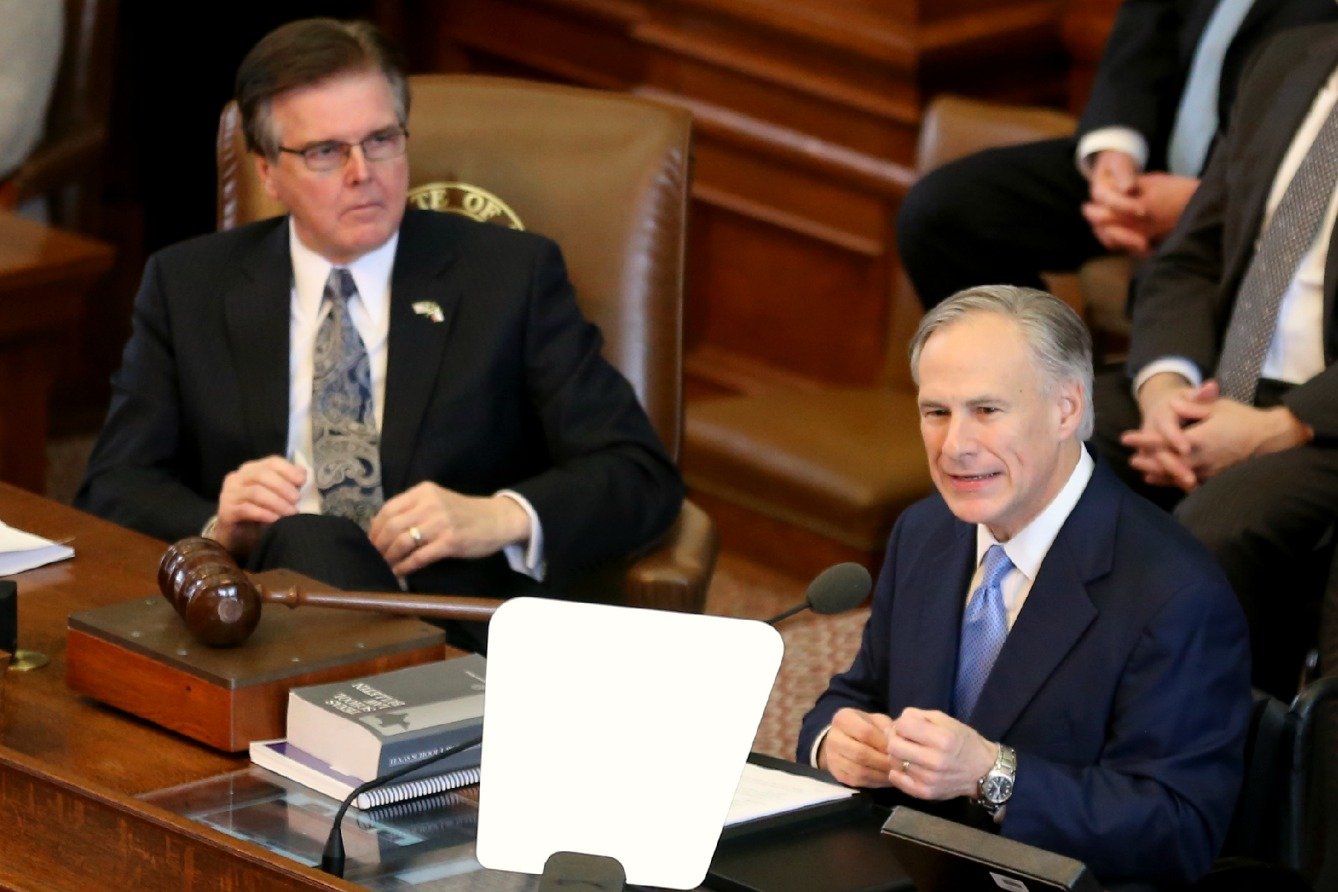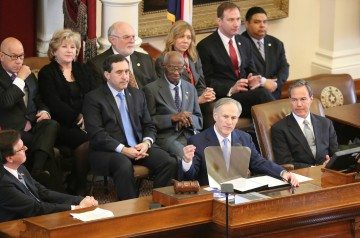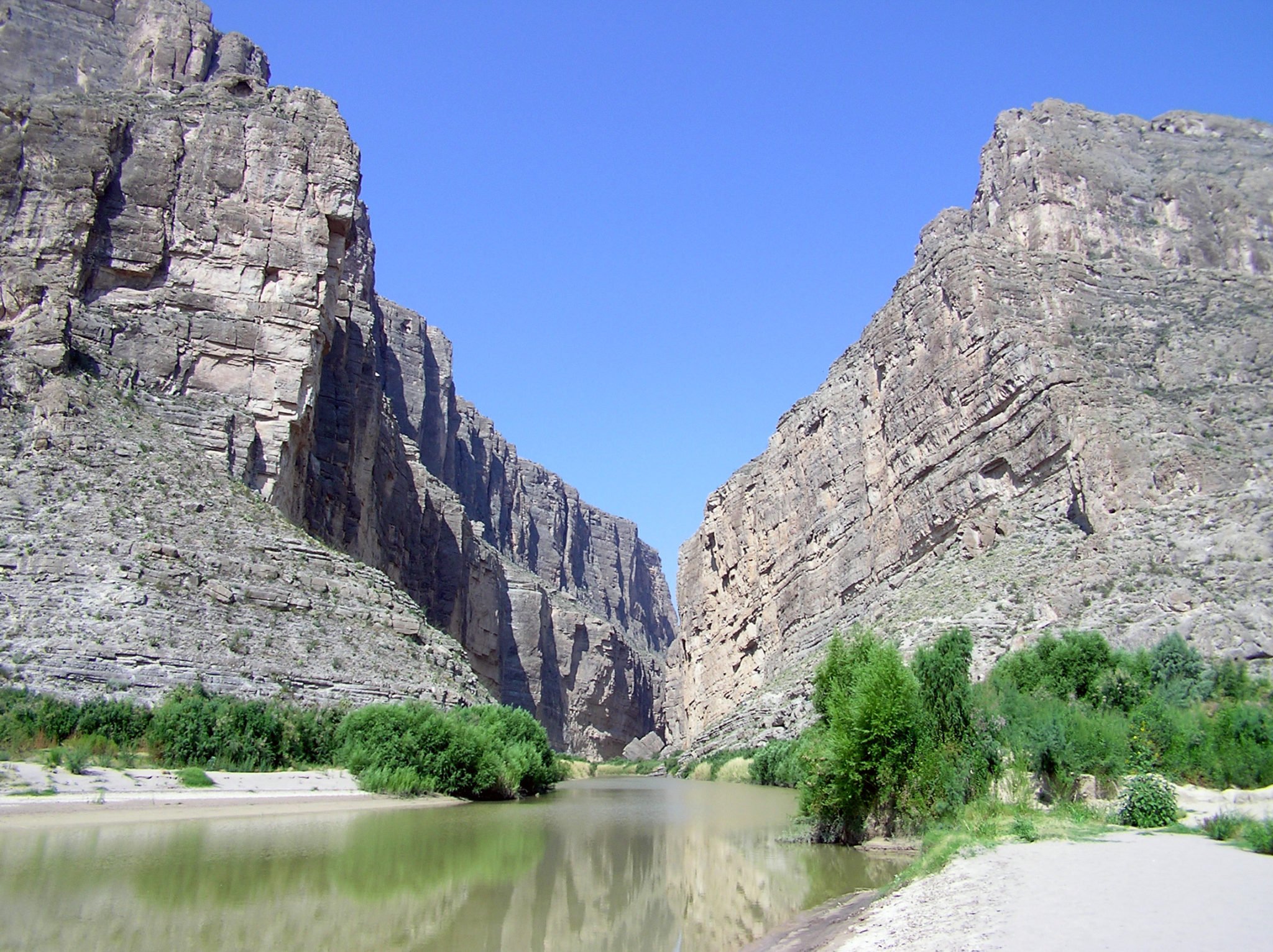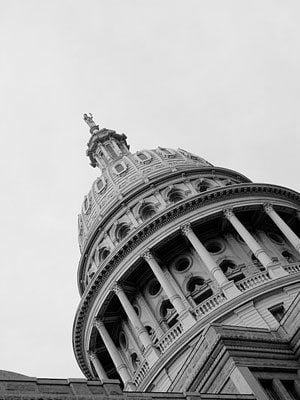
A Sun Arises: Greg Abbott’s New Day

Above: Gov. Greg Abbott and Lt. Gov. Dan Patrick at the State of the State Address, February 17, 2015.
What kind of governor will Greg Abbott be? He ran a mostly policy-free campaign, save for an ad about how bad traffic is—though to be fair, his Democratic opponent was even worse on this front—and his inaugural speech was overwhelmed by both the pomp and circumstance of the occasion and the pomp and circumstance of Lt. Gov. Dan Patrick.
Abbott’s State of the State speech, delivered today before a joint session of the Legislature, was his first real chance to establish the tone of his tenure in office. He positioned himself, generally, as a somewhat cautious moderate. He outlined a few broadly acceptable policy priorities, such as expanding early education programs and ethics reform. Otherwise, he mostly followed the path set by the Legislature.
“I’m proud to report that as the sun arises on 2015, the state of Texas is strong, and together we’re about to make it stronger,” Abbott told the Legislature. (Combine Abbott’s flourish with Patrick’s inaugural declaration, and we have a motto for the 84th Legislature: The sun arises on a new day in Texas.)
As with any governor, Abbott’s emergency items—he laid out five today—probably tell us a lot about his priorities. Legislation pertaining to emergency items can be considered early and generally receive special consideration by the Lege. Rick Perry—remember him?—frequently used these emergency item declarations as a way to throw red meat to the base.
But four of Abbott’s items are relatively bread-and-butter issues—Abbott calls for expanding pre-K, boosting funding for university research programs, raising transportation funding and strengthening state ethics laws.
The fifth is border security, the closest Abbott gets to a red-meat issue. But his budget anticipates an end to the National Guard mission to the border as soon as the Department of Public Safety can reasonably replace them. Patrick wants funding for the National Guard deployment to be continued through the next biennium, and strongly implied the governor agreed with him. Abbott does not, apparently, but he did call for border security funding to be doubled for the next biennium, for a total of $735 million—putting himself closer to the Senate budget than the House budget.
He talked about meeting a “young Latina” in the Rio Grande Valley who “pleaded with me to keep my promise to secure the border.”
That didn’t stop Patrick from giving his blessing. In a statement, Patrick said Abbott’s speech contained “everything I wanted to hear in the State of the State address,” and underlined Abbott’s call for “additional border security” and “school choice.” Patrick’s strategy for dealing with Abbott appears to be to hug him to death and hope compliance follows—we’ll see how well that works.
There was plenty else in the speech besides the emergency items. Many of Abbott’s proposals include additional spending, but he also called for $4.2 billion in tax cuts. The two just might be able to coexist this year, with a healthy budget surplus, but Abbott says he’d like to make the tax cuts permanent. He also called for a constitutional amendment to limit spending increases to population growth plus inflation, a measure long touted by the Texas Public Policy Foundation that’s never gained much traction. On some of these budget issues, he’s closer to the right wing of his party than the middle—so far, the House hasn’t seemed especially excited about sweeping tax cuts.
He’s pushing for more support of the state’s community college system, and wants more funding to support the state’s veterans. He told the Legislature that it was “time to put school finance litigation behind us”—the same litigation he was aggressively prosecuting as attorney general—but he didn’t say much about how the state should do that.
He didn’t have much to say about guns, one of the hot issues at the Capitol right now, except for a line that pledged he would “expand liberty in Texas by signing a law that makes Texas the 45th state to allow open carry” of handguns. That wasn’t enough for one of the Legislature’s biggest proponents of open carry, state Rep. Jonathan Stickland (R-Bedford), who told the Observer after the speech that open carry “should have been an emergency item,” and that he was skeptical of all the spending proposals in Abbott’s speech.

We learned a bit more about the personal style of a governor who still, despite all of the theatrics last year, remains a bit cryptic. Twice, he deployed anecdotes about young girls to pull at legislators’ paternalistic heart strings: While talking about border security, he talked about meeting a “young Latina” in the Rio Grande Valley who “pleaded with me to keep my promise to secure the border.” She knew the children of cartel members, Abbott said, and they frightened her. And then there was Keisha Riley of Houston, whose young daughter wiped tears from her cheek as she asked Abbott for better schools.”
Abbott positioned himself today as a pragmatic and thoughtful problem-solver.
“Our fellow Texans face so many challenges: the need for better schools, more roads, border security, better healthcare, more jobs. They want more liberty and less government, and they deserve ethics reform,” Abbott said. “We can’t let their future be defined by these challenges.”
But the as-yet unwritten history of the 84th and 85th Legislatures, over which Abbott will preside, will be determined by factors and circumstances largely outside of his control. For a reminder of how that can manifest itself, look no further than Rick Perry’s first State of the State address, from January 2001.
Back then, with a handsome young face and an even more magnificent head of hair, Perry sounded almost like a Democrat. The state needed to make changes, Perry said: better schools, more roads, better health care, more jobs, better government. The poor residents of the border colonias, he said, needed better access to health care and the state needed to do more to eradicate infectious diseases among border communities. These challenges, Perry told the Legislature at the dawn of a bright new era, are “all worthy of our ever-vigilant effort.”
But for the next 14 years, the Legislature lurched from strained budget to strained budget. Perry found it more beneficial to move to the right, and an increasingly fractious Legislature started to look to the right too. The center couldn’t hold. Fourteen years after that speech, the problems Texas face are still more or less the same.
So although observers are going to point to Abbott staking out ground in the middle—and he is, on some issues—be careful of drawing too many conclusions about what that will ultimately mean. And enjoy the new day’s new dawn while it lasts.


